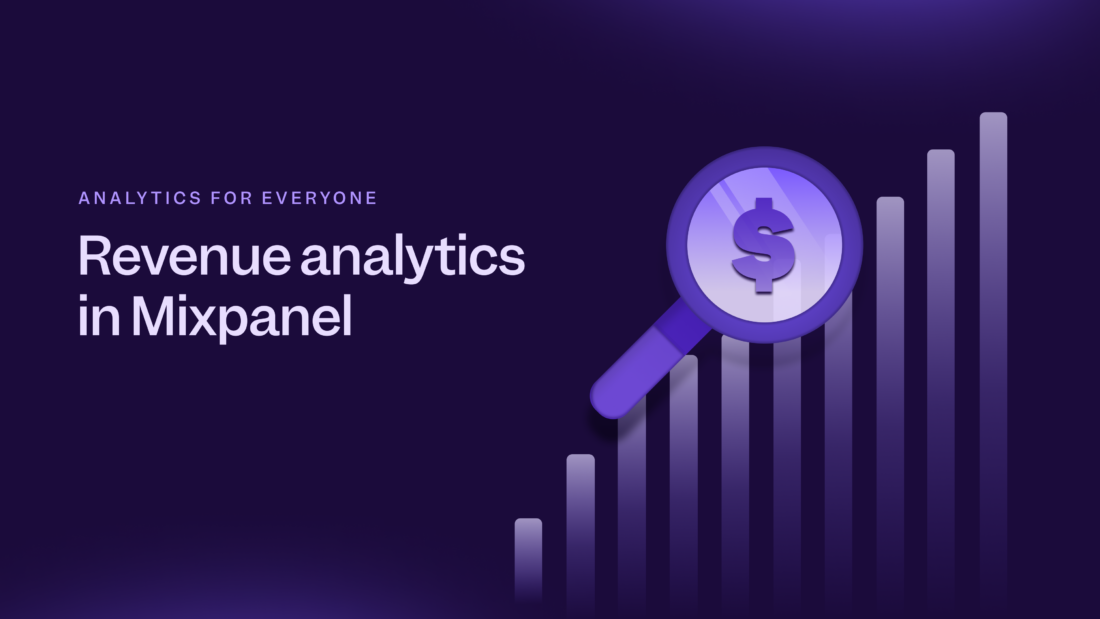
Revenue analytics in Mixpanel
Event analytics shines for revenue data. We’re making it easier to build a company scorecard in Mixpanel that all teams driving revenue can align on.

When we set out to bring event analytics to everyone, we knew that analytics for company revenue data, in particular, would be a unifying force for the cause. Everyone in an org wants to drive more revenue and see the impact of their work on that revenue growth.
Mixpanel can do this well today, and with the new features we have in the works, we’re going to make revenue analytics even more powerful and easy to set up. In addition to being the place where product and marketing teams work together to measure success, we want Mixpanel to be the company scorecard that all teams collaborating to drive revenue can align on.
Let’s dig in on why this is important and how we’re doing it.
Driving efficient growth is a team sport
While product, marketing, sales, and services teams all work toward efficient revenue growth for their companies, most of the time, they’re each chipping away at this shared goal from different vertical tools (Salesforce, Marketo, Zendesk, etc.). This results in disparate analyses, each limited by the narrow view of only the data each team manages—and never mind that these workflow tools tend to offer analytics as only a minor feature.
Limited, siloed data spread across tools can’t provide a unified view of how the company is performing. Plenty of companies today have become aware of this problem. They’ve started bringing all their data into cloud data warehouses and tried different solutions to make sense of it—often to no great success.
With Mixpanel, there’s a better way to put this data to work—together—to easily create a full picture of what is and isn’t driving revenue for your company.

Keeping Mixpanel up to date with your warehouse data
There’s one critical feature we’ve released that makes all of this easier than ever. It’s called Warehouse Connectors and it allows you to natively import data from your data warehouse into Mixpanel. Without any engineering lift, teams can take advantage of their existing wealth of trusted data and enable fast, self-serve analysis.
Shared truth has many advantages
If you’ve ever gotten two completely different answers to a question from different parts of the organization, you know having a source of truth (and tools to properly access it) is big. You can’t confidently make the right decisions for the business without it. When teams align around shared metrics in Mixpanel, they have one, true scorecard that unites them. You also get a separate lift in data trust because all teams now work as one to address data issues vs. independently in silos that create further inconsistencies across the org.
Warehouse Connectors is launching in an upcoming closed beta, but we plan to have it available for all Mixpanel users in the coming months—and for free on all of our plans. For more on how Warehouse Connectors will work and what other use cases it will unlock in Mixpanel beyond revenue analytics, read how our teams at Mixpanel have been using it with business data from around the company.
Event analytics shines for revenue
Most companies are deeply limited in understanding their true revenue funnel. Why? Because even when they can successfully bring their data together to create a strong source of truth, they often resort to trying to analyze it with generic business intelligence (BI) tools that cost a lot of time and money to operate and tend to still fall short of delivering actionable insights. What’s needed is a simple way to connect how you go from demand to monetization. Mixpanel was designed to easily connect dots like these because it uses event analytics.

With events, you can trace your revenue back to the beginning and understand not just where the demand was generated but how it eventually converted to revenue.
- Did that campaign from last quarter have any direct lift on annual recurring revenue (ARR)?
- How much revenue can you attribute to that new feature we spent months launching?
Events are better at getting to the full story because they’re not tied to any functional view. It’s no longer marketing data, sales data, or product data but rather pure customer event data that gives you the full monetization picture. When you get conviction about your revenue funnel, you can do so many things better: decide where to focus for maximum impact, reduce cost on things that don’t work, produce better forecasting, and on and on.
Layers of analytics working together
As we unlock more areas of analysis in Mixpanel, really what we’re doing is adding more layers to the platform—not separate verticals. This is how we ensure product analytics feeds seamlessly into marketing analytics just as well as marketing analytics feeds into product analytics. And each of those can inform and be informed by revenue analytics. That’s the beauty of event data: It can all be analyzed together, no matter the team or any other source it originates from, and we want to maintain that fluidity in Mixpanel.

This is the only way we’re able to make Mixpanel a destination where you can easily explore data from all across the company with your teammates through our collaborative Boards and real-time reports.
There will be a lot more coming in the next few months to let you go even further with revenue analytics in Mixpanel, so stay tuned! We have big ambitions to enable teams from all over the org to see how their efforts are making an impact on the bottom line 💰
Gain insights into how best to build for your users and your business with Mixpanel’s powerful event analytics. Try it free.





